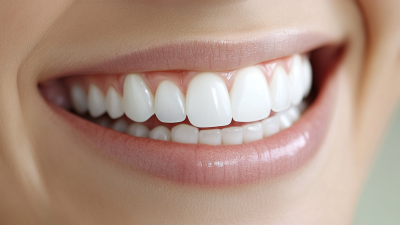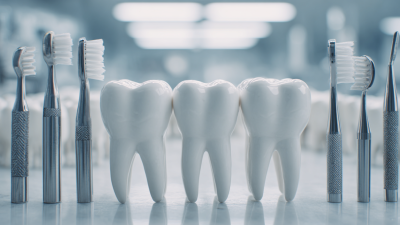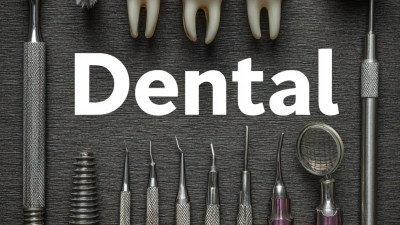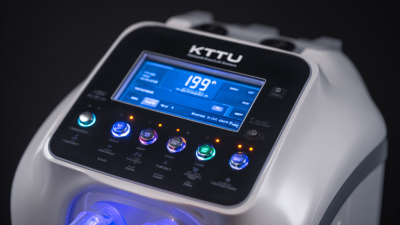How to Choose the Perfect Dental Guard for Your Nighttime Protection
When it comes to achieving a good night's sleep, the importance of a Dental Guard cannot be overstated. According to the American Dental Association, nearly one in four adults experience bruxism, a condition characterized by grinding or clenching teeth, often during sleep. This repetitive motion can lead to jaw pain, tooth wear, and other dental issues, making the use of a dental guard essential for nighttime protection. Studies have shown that custom-fitted dental guards can significantly reduce these problems, providing not only comfort but also shielding teeth from potential damage. As the market for dental products continues to expand, understanding the various types of dental guards available, their benefits, and how to choose the right one for your needs is crucial for long-term oral health and overall well-being.

Understanding the Importance of Nighttime Dental Guards for Oral Health
Nighttime dental guards play a crucial role in preserving oral health for individuals who suffer from bruxism, a condition characterized by the involuntary grinding or clenching of teeth during sleep. This unconscious behavior can lead to a multitude of dental issues, including worn enamel, increased tooth sensitivity, and even jaw pain. By using a dental guard, you can shield your teeth from excessive wear and maintain the integrity of your smile. These guards are designed to create a barrier between your upper and lower teeth, minimizing the damage caused by grinding and reducing the strain on your jaw muscles.
In addition to protecting your teeth, nighttime dental guards can also contribute to better overall health. The reduction of jaw tension can alleviate headaches and temporomandibular joint (TMJ) disorders, which are often exacerbated by teeth grinding. Furthermore, a good dental guard can improve sleep quality by preventing disruptions caused by clenching. Selecting the right dental guard involves considering factors such as material, fit, and comfort, ensuring that your choice not only protects your teeth but also enhances your nighttime rest. Prioritizing these guards can lead to significant improvements in both oral and overall health, making them an essential component of your nightly routine.
Nighttime Dental Guards: Importance and Impact on Oral Health
Types of Dental Guards: Custom, Boil-and-Bite, and Stock Options
When it comes to safeguarding your teeth during sleep, choosing the right dental guard is essential. There are three main types to consider: custom, boil-and-bite, and stock options. Custom dental guards are tailored specifically to your mouth, ensuring the best fit and maximum comfort. These guards are typically made from high-quality materials and offer superior protection against grinding and clenching.
Boil-and-bite guards are a more affordable alternative. To use them, you simply boil the guard in water to soften it, then bite down to shape it to your teeth. This option provides a better fit than stock guards, but it may not be as comfortable or durable as a custom-made solution. Second, always follow the manufacturer’s instructions carefully for optimal results.
Stock options are pre-formed and ready to wear. While they are the least expensive, they often do not provide a good fit, which can impact their effectiveness. If you choose this route, look for guards with adjustable straps to improve comfort. Remember, the right choice depends on your specific needs and budget, so consider consulting with your dentist for personalized advice.

Key Features to Consider When Choosing a Dental Guard
When selecting the perfect dental guard for nighttime protection, several key features should be at the forefront of your decision-making process.
First, consider the material of the guard. Dental guards are commonly made from thermoplastic or soft silicone, providing varying levels of comfort and durability. A soft guard may be ideal for those primarily dealing with teeth grinding, as it cushions the jaw.
In contrast, a firmer guard can offer added protection for those with a history of dental damage.
Another crucial aspect is the fit. A well-fitting dental guard should feel snug but not overly tight, ensuring that it stays in place throughout the night.
Custom-fitted options tend to provide the best comfort and protection, as they are molded to the unique shape of your teeth. If a custom option isn’t feasible, look for guards that come with an adjustable feature or those that can be boiled to create a closer fit.
Additionally, consider the thickness of the guard; while thicker guards provide more protection, they may also feel bulkier.
Lastly, think about the ease of cleaning and maintenance. A guard that is easy to clean will help prevent the buildup of bacteria, ensuring optimal oral health.
Some guards are dishwasher-safe or easily rinsed, making them more convenient for nightly use. By paying attention to these critical features, you can make an informed choice that prioritizes both comfort and protection for your dental health.
How to Properly Fit Your Dental Guard for Maximum Comfort
Choosing the right dental guard for nighttime protection is essential for ensuring comfort and effectiveness. A properly fitted dental guard not only protects your teeth from grinding and clenching but also minimizes discomfort during sleep. According to a report by the American Dental Association, up to 31% of adults grind their teeth at night, highlighting the need for effective protective solutions.

When fitting your dental guard, ensure that it forms a snug yet comfortable fit over your teeth. This can be achieved by boiling the mouthguard in water to soften it and then molding it to your dental arch. Tips for maximum comfort include ensuring that the guard does not obstruct your breathing or gag reflex. Furthermore, choosing a flavored option can significantly enhance your experience, making you more inclined to wear it consistently.
It is also important to consider the style of mouthguard; options range from custom-fitted guards to over-the-counter varieties. A study indicated that while custom-fit guards provide the best protection, many users find comfort with boil-and-bite styles. Always ensure proper hygiene by cleaning your mouthguard regularly to prevent bacteria buildup and maintain optimal oral health.
Maintaining and Caring for Your Dental Guard to Ensure Longevity
Proper maintenance and care of your dental guard are essential for ensuring its longevity and effectiveness. Just like any other dental appliance, a mouthguard requires regular cleaning to prevent the buildup of bacteria and plaque. It’s advisable to rinse your dental guard with cool water and use a soft toothbrush to clean it daily. Avoid harsh soaps or toothpaste that can damage its material. Storing your guard in a ventilated case when not in use can also help prevent damage and maintain its shape over time.
In addition to daily care, keep an eye on your dental guard for signs of wear and tear. If it shows cracks or becomes misshapen, it may no longer offer the protection you need while sleeping. Regular checks ensure that you get the most out of your investment in dental health, as maintaining your mouthguard is as vital as the initial choice in selecting the appropriate one. By integrating these care practices, not only do you extend the life of your dental guard, but you also contribute to your overall oral hygiene, safeguarding your teeth as you age.
How to Choose the Perfect Dental Guard for Your Nighttime Protection - Maintaining and Caring for Your Dental Guard to Ensure Longevity
| Feature | Description | Care Instructions | Estimated Lifespan |
|---|---|---|---|
| Material Type | Soft, hard, or dual laminate | Rinse with cool water after use | 1-3 years depending on material |
| Fit Type | Boil and bite, custom fit, or over-the-counter | Store in a dry case when not in use | 6 months to several years |
| Comfort Level | Varies based on fit and material | Adjust the fit or consult a dentist | 1-2 years with proper care |
| Price Range | $20 - $500 based on customization | Regular cleaning and inspection | Variable, depending on use |
| Dental Conditions | Bruxism, TMJ, etc. | Follow dentist's advice on care | Depends on individual wear |
Related Posts
-

Mastering the Art of Choosing the Best Surgical Loupes for Optimal Precision in Medical Practice
-

The Future of Dental Items Market in 2025 and Essential Strategies for Global Buyers
-

7 Essential Tips for Sourcing the Best Dental Products Globally
-

5 Must-Try Whitening Mouthwash Innovations for Global Buyers in 2023
-

Ultimate Checklist for Sourcing the Best Dental Items for Your Practice
-

Choosing the Right Manufacturer for the Best Teeth Whitening Machine to Boost Your Business
